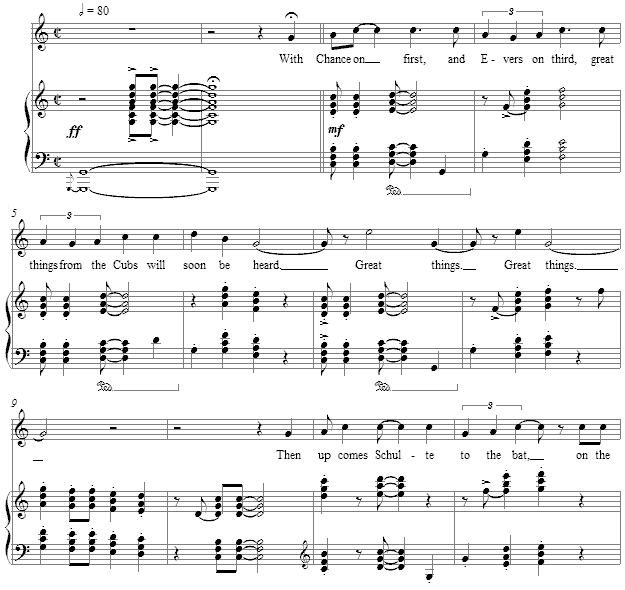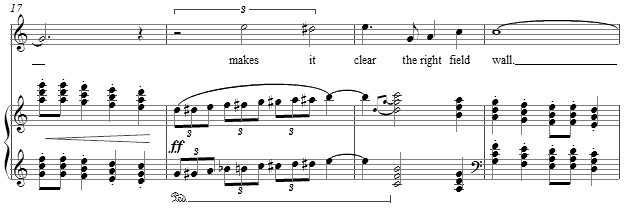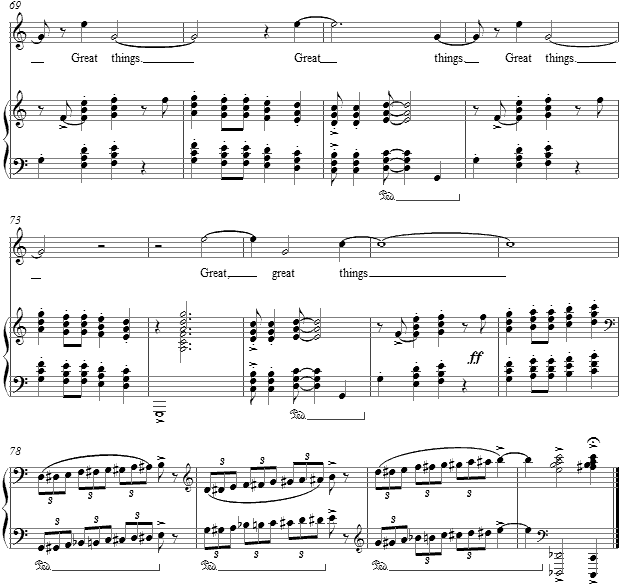Music and Texts of GARY BACHLUND
Vocal Music | Piano | Organ | Chamber Music | Orchestral | Articles and Commentary | Poems and Stories | Miscellany | FAQs
The Opening Game - (2008)
Ernest Hemingway
for medium voice and piano
With Chance on first, and Evers on third,
Great things from the Cubs will soon be heard.
Then up comes Schulte to the bat,
On the plate his bat does rap;
Takes a slug at that old ball,
Makes it clear the right field wall.
Then in comes Chance and in comes Evers,
Such hits are seldom seen -- most never.
Then to the bat comes Zim in haste,
He sure knows how the ball to paste.
He slams that ball upon the Bean,
Almost seems to make it scream.
The center fielder nabs the ball;
It seems as if t'would make him fall.
But stop this rank stuff,
Just one inning is enough.
from the Oak Park Journal, 1912
[ 6 pages, circa 2' 05" ]
Ernest Hemingway
Baseball is for many Americans the national pastime. Among the lore of baseball is the trio of "Tinkers to Evers to Chance" which refers to the first and very effective double play. The trio of baseball players became known as one after they appeared in a game together on September 2, 1902. Their first double play came the next day, September 3, 1902. For this, Franklin Pierce Adams wrote his now legendary 1910 poem, a single stanza from the point of view of a New York Giants fan seeing the Chicago Cubs infield of shortstop Joe Tinker, second baseman Johnny Evers, and first baseman Frank Chance complete one of the many double plays which set them into baseball history and legend. Adams poem [ 1 ] reads:
These are the saddest of possible words:
"Tinker to Evers to Chance." [ 2 ]
Trio of bear cubs, and fleeter than birds,
Tinker and Evers and Chance.
Ruthlessly pricking our gonfalon bubble, [ 3 ]
Making a Giant hit into a double --
Words that are heavy with nothing but trouble:
"Tinker to Evers to Chance."
Hemingway's poem written two years later refers to this same three sports heroes, but Hemingway's is written from the sports writer's and Cubs fan's perspective, as Hemingway tells us of "great things," not Adams' "trouble." Such is the nature of sports, not to mention politics, in which one side is cheered for and the other against. Hemmingway, moreover and unlike Adams' poem, tells us of some more of the team's players, Schulte and Zim, and notably not mentioning Joe Tinkers.
The vocal range is only an octave, and therefore apt for most voices. The syncopation is from among the standard "American fare," in parallel to the rather American style text, rhyme and scansion. The parallel quartal, pop chords in the accompaniment underpin a vocal line meant to be delivered directly and without subtlety.
The flight of the ball over the "right field wall" is a rising chromatic passage, with pedal down to blur the harmonics before returning to the more secco, crisp style of accompaniment.
Hemingway promises "great things," and it is to this that the several repetitions of the phrase point, for unlike Adam's rueful poem and its insistence on the strategy of the double play, Hemingway mentions more specifically the hitting of the members of team, for scoring in baseball requires putting the players "on base" without which no game is won.
The score for The Opening Game is available as a free PDF download, though any major commercial performance or recording of the work is prohibited without prior arrangement with the composer. Click on the graphic below for this piano-vocal score.
NOTES
[ 1 ] Titled "Baseball's Sad Lexicon," Adams poem is sometimes more popularly known as "Tinker to Evers to Chance."
The poem is a single, sad stanza from the point of view of a New York Giants fan seeing the talented Chicago Cubs infield of shortstop Joe Tinker, second baseman Johnny Evers, and first baseman Frank Chance complete a double play. "Hitting a double" in baseball means a two-base hit, but "hitting into a double" refers to hitting into a double play (two outs on a single play), most commonly accomplished by a ground ball hit to the shortstop (Tinker) thrown to the second baseman (Evers) to force the runner out who had been on first base and then thrown to first base (Chance) to complete the play. Franklin Pierce Adams who was a Chicago Cubs fan, a sportswriter for the New York Evening Mail and a poet thanks to an article that his editors said was too short — making him pen "Baseball's Sad Lexicon" to fill that space on the column and page. It was published in the New York Evening Mail (July 10, 1910).
[ 2 ] Tinkers to Evers to Chance: Cubs shortstop Joe Tinker, second baseman Johnny Evers and first baseman Frank Chance. (Johnny Evers pronounced with a long e, as "Ee-vers.") Evers said, "Tinker and myself hated each other, but we loved the Cubs. We wouldn't fight for each other, but we'd come close to killing people for our team. That was one of the answers to the Cubs' success." Ogden Nash penned his pun in these lines which note Evers' pugnacious competitiveness (in "Line-Up For Yesterday," 1949): "E is for Evers / His jaw in advance; / Never afraid / To Tinker with Chance."
[ 3 ] Gonfalon, originally a Frankish word for a flag hanging from a crosspiece instead of an upright staff, usually ending in streamers. The standards of any of the medieval republics of Italy were pennants or flags like these as are many ecclesiastical banners, but in this case and in this context it refers to the National League title pennant.



